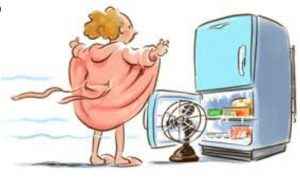As many of our patients will know, Bishopsgate Dental Care is now staffed by an all-female team. This in turn does tend to lend itself to female-related topics of conversations in the staff room – from monthly hormonal cycles, female health issues, child care, diets…. I once worked with a young man who, on completing his vocational trainee year (first year as a qualified dentist) thanked us not only for the knowledge he had gained about the everyday world of dentistry but also very importantly, for the education he had received about the female reproductive system from the staff room that would stand him in good stead for the rest of his life!!
Talking about the relationship between menopause and teeth
What we had never really talked about in the lunch break was the menopause. This changed however as soon as I (who was then the oldest member of the team) started waking up during the night boiling and drenched in sweat. These hot flushes soon crept into daylight hours as well and I’m afraid, I have not suffered in silence. I have shared this with the team (apologies team) and patients alike (apologies to those of you) – several times a day being heard to say, I am so hot, turn that radiator off, can you open that door or where is my fan. I have had some really interesting chats with other female patients of a similar age comparing symptoms and supplements that could help.
As well as hot flushes (which should be renamed internal balls of fire as ‘hot flush’ is nowhere near what it feels like) some of the other menopause symptoms we are all aware of are osteoporosis, depression, mood swings, weight gain and fatigue from poor sleep. What we don’t hear about and what is relevant to us as a dental practice is that the hormonal fluctuations during menopause and peri-menopause can make you more vulnerable to tooth decay, gum disease and other dental health problems. This makes menopause a particularly important time for us ladies to keep a check on our dental health and hygiene.
The connection between menopause and oral health is complex. Teeth, gums and bones are very susceptible to the hormonal changes taking place during this time and as some of the changes are subtle your Dentist or Hygienist may be the first to notice:
Menopause and Dry Mouth (XEROSTOMIA)
Low levels of oestrogens in the body can cause a dry mouth. This can impact chewing, swallowing and speaking. Dry mouth also affects tooth enamel as saliva helps to protect our teeth from harmful acids and bacteria. When the mouth is dry, bacteria are more likely to attack and damage tooth enamel which can lead to sensitive teeth, tooth decay and gum disease. Staying hydrated can help but do tell your Dentist or Hygienist if you have concerns about dry mouth as menopause and dry mouth can be linked.
Osteoporosis Can Affect Alveolar Bone
The alveolar bone in the jaw is the support system for your teeth. With a lack of oestrogens in the body, menopause can often put women at risk of developing osteoporosis, a condition in which bones can become thinner. Women with systemic osteoporosis are more susceptible to bone loss around their teeth and thinning of the jaw bone. Having regular check-ups with your Dentist can help detect any changes.
Oral Cavity Soft Tissues
During and after menopause, you may see changes to the soft tissues in your mouth. Gums can appear redder and can become sore after eating acidic foods. Bleeding gums, ulcers and candida (thrush) can all be caused by hormonal changes. Your Dentist or Hygienist can offer help and advice if you are having any of these problems.
Menopause and Burning Mouth
Burning Mouth Syndrome is a condition that causes a burning feeling in your mouth. The sensation can develop suddenly and occur anywhere in the mouth, more commonly felt on the roof of your mouth, tongue and lips. Although the causes are hard to pin down, low oestrogen levels can be a contributory factor.
Menopause and a burning mouth could occur due to many changes due to the hormonal shifts in the body, some of which may affect the health of our mouth. However, you can help keep your teeth and gums healthy during this transition by visiting your dentist to take the best possible care of your smile.
Booking an Appointment is Easy at Bishopsgate
We are known for providing our London patients with premium dental care, personalised appointments, and some of the area’s finest dental practitioners. We open our doors at 8am every weekday, and close for the day at 5pm or later. You can book online or call our friendly team on 0207 377 6762.
We look forward to providing you with an impeccable dental experience.






